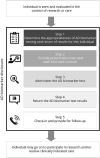Testing for Alzheimer Disease Biomarkers and Disclosing Results Across the Disease Continuum
- PMID: 36720642
- PMCID: PMC10238153
- DOI: 10.1212/WNL.0000000000206891
Testing for Alzheimer Disease Biomarkers and Disclosing Results Across the Disease Continuum
Abstract
Three pathologic processes are characteristic of Alzheimer disease (AD): β-amyloid, hyperphosphorylated tau, and neurodegeneration. Our understanding of AD is undergoing a transformation due to our ability to measure biomarkers of these processes across different stages of cognitive impairment. There is growing interest in using AD biomarker tests in care and research and, with this, a growing need for guidance on how to return these sensitive results to patients and participants. Here, we propose a 5-step approach informed by clinical and research experience designing and implementing AD biomarker disclosure processes, extant evidence describing how individuals react to AD biomarker information, ethics, law, and the literature on breaking bad news. The clinician should (1) determine the appropriateness of AD biomarker testing and return of results for the particular patient or research participant. If testing is appropriate, the next steps are to (2) provide pretest education and seek consent for testing from the individual and their support person, (3) administer testing, (4) return the results to the individual and their support person, and (5) follow-up to promote the recipient's well-being.
© 2023 American Academy of Neurology.
Conflict of interest statement
E.A. Largent has no disclosures relevant to the manuscript. J.D. Grill reports research support from Eli Lilly, Genentech, Biogen, Eisai, NIA (P30AG066519, U24 AG057437), the Alzheimer's Association, and BrightFocus Foundation; he has provided consulting to SiteRx, Cogniciti, and Flint Rehab. K. O'Brien and K. Harkins report no disclosures relevant to the manuscript. D. Wolk has consulted for GE Healthcare, Eli Lilly, and Qynapse; he serves on the DSMB for Functional Neuromodulation; he has been a site-PI for a study by Biogen. J. Karlawish is a site investigator for Eli Lilly, Biogen, and Eisai. Go to
Figures

Comment in
-
Scientific, Ethical, and Practical Considerations for the Testing and Disclosure of Alzheimer Disease Biomarkers.Neurology. 2023 May 23;100(21):993-994. doi: 10.1212/WNL.0000000000207199. Epub 2023 Feb 15. Neurology. 2023. PMID: 36792374 No abstract available.
References
-
- Pinner G, Bouman WP. What should we tell people about dementia? Adv Psychiatr Treat. 2003;9(5):335-341. doi: 10.1192/apt.9.5.335. - DOI
-
- Roberts JS, Ferber R, Blacker D, Rumbaugh M, Grill JD, for the Advisory Group on Risk Evidence Education for Dementia (AGREED). Disclosure of individual research results at federally funded Alzheimer's Disease Research Centers. Alzheimers Dement (NY). 2021;7(1):e12213. doi: 10.1002/trc2.12213. - DOI - PMC - PubMed
